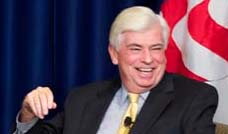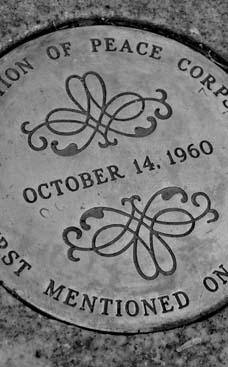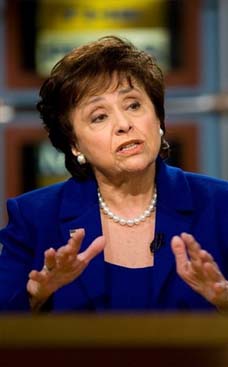
Hessler engages the reader with his own affection and fascination for an ancient culture in overdrive. Endlessly curious, fluent in the language, willing to go anywhere, and talk to anyone, his graceful prose carries us along, into the mountains, the dusty deserts, the mud-walled village huts and concrete factories, but most of all into the lives of the people he meets. Author Peter Hessler served as a Peace Corps Volunteer in China.
Lynn Harnett reviews Peter Hessler's "Country Driving: A Journey Through China from Farm to Factory"
Book review: A road trip through the racing heart of China
February 28, 2010 2:00 AM
Country Driving: A Journey Through China
from Farm to Factory
Peter Hessler
Harper
The first section of New Yorker writer Hessler's engrossing three-part portrait of China's headlong rush to the future is peppered with questions from the Chinese driving test:
"223. If you come to a road that has been flooded, you should
a) accelerate so the motor doesn't flood.
b) stop, examine the water to make sure it's shallow, and drive across slowly.
c) Find a pedestrian and make him cross ahead of you."
Hessler came to China in 1996 with the Peace Corps and stayed for 10 years. He got his license in 2001, as roads and drivers were proliferating, and planned a cross-country trip. Development was intense in coastal regions but the north and west were still remote, many roads unlabeled.
"352. If another motorist stops you to ask directions, you should
a) not tell him.
b) reply patiently and accurately.
c) tell him the wrong way."
He decided to follow the Great Wall, which is actually a series of fortifications built of various materials in various states of ruin. It was harvest time and the farmers laid their produce on the edges of the road for sorting and drying and threw grain into the middle for threshing.
"Initially I found it hard to drive over food. On the first day of my journey, I screeched to a halt before every pile, rolling down the window. 'Is it OK for me to go through?' The farmers shouted back impatiently 'Go, go, go!' And so I went - millet, sorghum, and wheat cracking beneath me. By the second day I no longer asked; by the third day I learned to accelerate at the sight of grain."
He meets amateur historians and government tree planters, picks up hitchhiking young people coming from factory towns to visit family, and camps in the desert to avoid officialdom (Hessler's favorite Chinese motto is "it's easier to ask forgiveness than permission.")
His prose meanders organically, exploring the China of the past and the present, from the Ming dynasty and the route of Genghis Khan to the roller-coaster excitement of road-testing the newest Chinese car.
He also proves his credentials here as a fearless adventurer. Few things can be more dangerous than driving in China, where driving lessons are laugh-out-loud bizarre, seat belts and turn signals are superfluous and traffic fatalities are twice as high as in the United States, with one-fifth the number of vehicles.
In Book II Hessler homes in on the traditional village, renting a house in mountainous, rural Sancha about two hours drive from Beijing (maps orient the reader at the start of each section - would there were pictures too!). There is only one child in the village (the young have migrated to the cities) and Hessler becomes friendly with Wei Jia's parents, Wei Ziqi and Cao Chunmei.
Handicapped by his lack of education (typical in the country), Wei Ziqi tried factory work, but returned to his village to farm. Smart and ambitious, he had tried and failed at leech farming and was now turning to tourism, which was following the better roads and increased prosperity.
Hessler limns the family's fortunes as Wei Ziqi builds a restaurant, and takes up the two essentials for doing business - smoking and drinking. As the friendship grows Hessler drives Wei Jia to boarding school kindergarten and witnesses Cao Chunmei's growing unhappiness and isolation. China remains a man's world and there's no place where that's more evident than the countryside.
Through his connection to the family, Hessler explores village gossip and politics, and takes part in the walnut harvest. In a harrowing section (which was a New Yorker article) Hessler encounters the Chinese medical system first-hand when Wei Jia becomes suddenly ill and it's Hessler, with his car and U.S. connections, who tracks down treatment.
Hessler's American sensibilities often illuminate the cultural contrasts. When the Weis grow rich enough to have a TV and Wei Jia comes home from school, the formerly tough and wiry boy grows soft in front of the TV eating junk food all day. Hessler frets about this, but to Cao Chunmei there's no point in having a TV if you don't watch it and few pleasures greater than watching a child eat.
The final section explores the burgeoning factory towns popping up along new expressways, each with a specialization - buttons, playing cards, umbrellas. "Datang produces one-third of the socks on earth."
Hessler chooses Lishui for his focus, a town that is about to have an expressway exit, and already has an Economic Development Zone. He gets in on the ground floor, approaching a city-dressed man outside a half-built factory and follows the fortunes of the place from factory design, which takes an hour and a half, to production (bra-strap loops), rocky times, success and reorganization.
Again, individuals provide the narrative impetus. The owners let Hessler hang around for good times and bad. Job interviews are a rough and tumble affair. The best incentives are lots of overtime and no vacations, since there's really nothing else to do.
Hessler finds another fascinating group to follow when, on the basis of outsize personality and persistence, a teenager gets jobs for her whole resourceful family, who also run a side business providing goods to workers.
There's tension in the beginning when the expensive machinery doesn't work, tension when the orders don't come in like they should, tension when their most crucial worker wants to visit his pregnant wife (code, maybe, for abandoning the sinking factory).
Contrasts and contradictions abound. The group dynamic is so strong one complaint can spark a sea of grumbling, but self-help books urge workers to lie and think solely of themselves. A precious baby's 50th-day celebration takes place in a cigarette-smoke filled restaurant amid spatters of hot oil.
Hessler engages the reader with his own affection and fascination for an ancient culture in overdrive. Endlessly curious, fluent in the language, willing to go anywhere, and talk to anyone, his graceful prose carries us along, into the mountains, the dusty deserts, the mud-walled village huts and concrete factories, but most of all into the lives of the people he meets.
Lynn Harnett, of Kittery, Maine, writes book reviews for Seacoast Sunday. She can be reached at lynnharnett@gmail.com.













